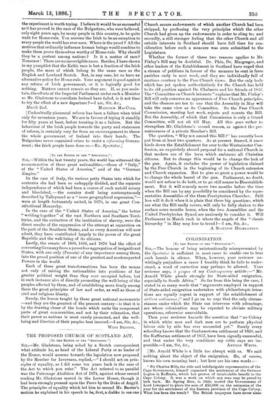THE PROPOSED CHURCH OF SCOTLAND ACT. [To THE EDITOR OF
THE "SPECTATOR-"]
Sia,—Mr. Gladstone, being asked by a Scotch correspondent what attitude he, as head of the Liberal Party or as leader of the House, would assume towards the legislation now proposed by the Member for Inverness, replied,—" I should act on prin- ciples of equality, as I did some ten years back in the case of the Act to which you refer." The Act referred to as parallel was the Patronage Abolition Act of 1874, against whose second reading Mr. Gladstone moved in the Lower House, though it had been strongly pressed upon the Peers by the Duke of Argyll. The principles of equality which led him to second Mr. Baxter's motion he explained in his speech to be, first, a dislike to see one
Church secure endowments of which another Church had been stripped, by professing the very principles which the other
Church had given up the endowments in order to cling to; and secondly, a still stronger feeling that the other Church and all outside interests in Scotland should have full time for con- sideration before such a measure was even submitted to the Legislature.
Whether the former of these two reasons applies to Mr. Finlay's Bill may be doubtful. Dr. Phin, Dr. Macgregor, and other leaders of the Establishment in Scotland have urged that a stream of petitions in favour of the measure be sent in from parishes early in next week, and they are individually full of cautious courtesy to the Free Church views. But the only body which has yet spoken authoritatively for the Church has held to its old position against Dr. Chalmers and his friends of 18-13.
The" Committee on Church interests "explains that Mr. Finlay's Bill will only conserve an appearance of Free Church principles, and the chances are ten to one that the Assembly in May will take the same view as its Committee. So the Free Church Commission, meeting last week, rejects and resents the Bill. But the Assembly, of which that Commission is only a Grand Committee, will not sit till May. All this goes rather to strengthen Mr. Gladstone's second reason, as against the pre- matureness of a private Member's Bill.
The question, "Why not amend this Bill I.'" has recently been put from at least two quarters. As at present framed, it anew binds down the Establishment for ever to the Westminster Con- fession, an exquisitely absurd proposal for a national Church in that modern use of the term which embraces all Christian citizens. But to change this would be to change the lock of the gun. Again, it excludes the power of legislation claimed by the Free Church in the beginning of its Church extension and Church expansion. But to give so great a power would be to change the whole barrel of the gun. Parliament, no doubt, would not refuse to do both, or to go still nearer to Diaestablish- ment. But it will scarcely move two months before the time when the Bill can by any possibility be considered by the repre- sentative Assemblies of the three Presbyterian Churches. Still less will it do it when it is plain that these big questions, which are what the Bill really covers, will only be fully shaken to the surface some months hence, when the two Assemblies and the United Presbyterian Synod are anxiously to consider it. Will Parliament in March rush in where the angels of the "classic hierarchy" in May may fear to tread P—I am, Sir, &c.,
A SCOTTIslI HIGHLANDER.






































 Previous page
Previous page